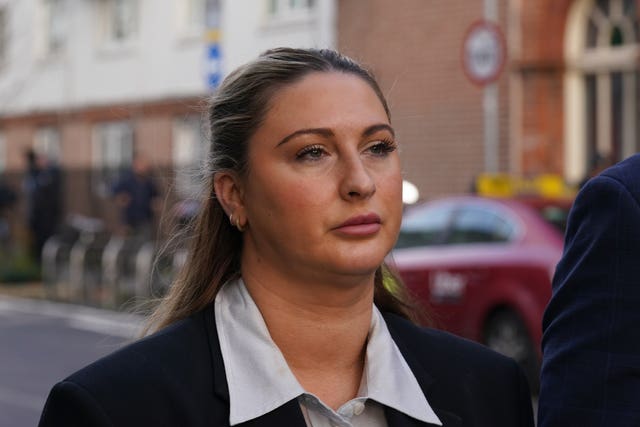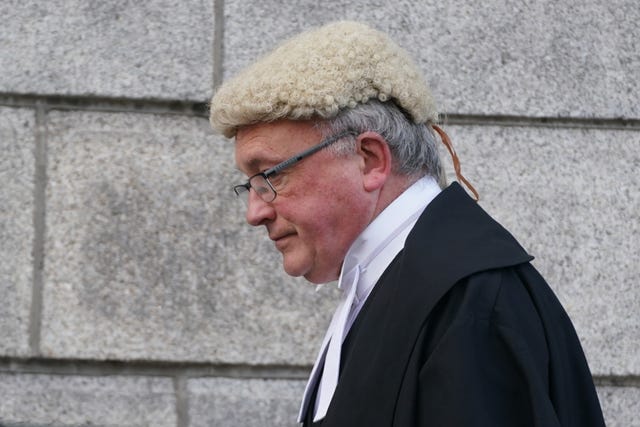The jury in a civil case against Conor McGregor will continue its deliberations at the High Court in Dublin on Friday.
Mr McGregor is facing an accusation in the civil action that he “brutally raped and battered” Nikita Hand at a hotel in south Dublin in December 2018.
The Irish sports star previously told the court he had consensual sex with Ms Hand in a penthouse at the Beacon Hotel.

Ms Hand, who is also known as Nikita Ni Laimhin, is also suing another man, James Lawrence, for assault.
Following two weeks of evidence and a number of days listening to closing speeches and the judges’ charge, the jury of eight women and four men started their deliberations at 3.03pm on Thursday.
Justice Owens spent two days summing up evidence heard over eight days, from witnesses including Ms Hand, Mr McGregor, Mr Lawrence, as well as police, paramedics, psychiatrists, an actuary, colleagues of Ms Hand as well as a former principal forensic medical officer.
He told the jury that he has concluded the evidence and is now asking them to go and deliberate in relation to the matters.
He reminded them of a number of legal principles, including the standard of proof in a civil case which is on the balance of probabilities and that the onus of proof rests on the plaintiff.
Justice Owens also reminded the jury, that if they reach a verdict to award damages, there are a number of types of damages to consider including general, which covers pain and suffering to date and into the future, as well as distress and recognition of vindication.

Another type of damage includes aggravated damage which is payment to recognition of offences that shock the plaintiff.
He urged them to be careful not to double count and to ensure they write everything down.
Exemplary damages are punitive damages which are to punish the defendant.
He said it should be an offence that is really serious, and that they can regard rape as really serious.
Justice Owens also said that someone attempting to cover up matters or making statements that are “patently untrue” are also serious.
Justice Owens told the jury to keep both of their feet “firmly on the ground” and to “use their common sense”.

He told the jury that if they reach the stage of awarding damages, and when assessing what to give when for loss of earnings, to deduct 15% from their figure.
He told them this was called a deduction for contingencies as we live in “an uncertain world”, and the courts say these things have to be taken into account.
While in the jury room, the jury will have an issue paper where they record their decisions.
It states two questions. The first is did Mr McGregor assault Ms Hand and the second is did Mr Lawrence assault Ms Hand.
They must answer yes or no to the questions. If they answer no to both then the matter ends there and Ms Hand loses her case.
If they answer yes to one or more, then the jury will move to the next stage and assess what damages to award Ms Hand.
Justice Owens warned the jury not to talk to anyone about their deliberations, including their loved ones who he said may be interested in the case.
He told the jury to “look at all the evidence”.
While outlining the summary of Mr McGregor’s evidence, the jury were told that they cannot draw any adverse inference from his “no comment” answers to police weeks after the alleged incident.




Why are you making commenting on The Herald only available to subscribers?
It should have been a safe space for informed debate, somewhere for readers to discuss issues around the biggest stories of the day, but all too often the below the line comments on most websites have become bogged down by off-topic discussions and abuse.
heraldscotland.com is tackling this problem by allowing only subscribers to comment.
We are doing this to improve the experience for our loyal readers and we believe it will reduce the ability of trolls and troublemakers, who occasionally find their way onto our site, to abuse our journalists and readers. We also hope it will help the comments section fulfil its promise as a part of Scotland's conversation with itself.
We are lucky at The Herald. We are read by an informed, educated readership who can add their knowledge and insights to our stories.
That is invaluable.
We are making the subscriber-only change to support our valued readers, who tell us they don't want the site cluttered up with irrelevant comments, untruths and abuse.
In the past, the journalist’s job was to collect and distribute information to the audience. Technology means that readers can shape a discussion. We look forward to hearing from you on heraldscotland.com
Comments & Moderation
Readers’ comments: You are personally liable for the content of any comments you upload to this website, so please act responsibly. We do not pre-moderate or monitor readers’ comments appearing on our websites, but we do post-moderate in response to complaints we receive or otherwise when a potential problem comes to our attention. You can make a complaint by using the ‘report this post’ link . We may then apply our discretion under the user terms to amend or delete comments.
Post moderation is undertaken full-time 9am-6pm on weekdays, and on a part-time basis outwith those hours.
Read the rules here